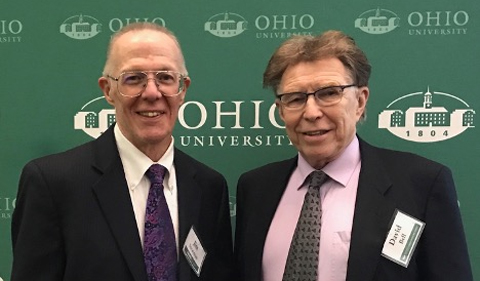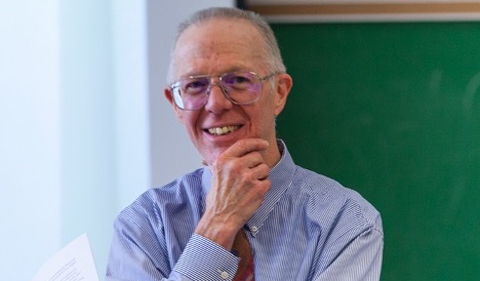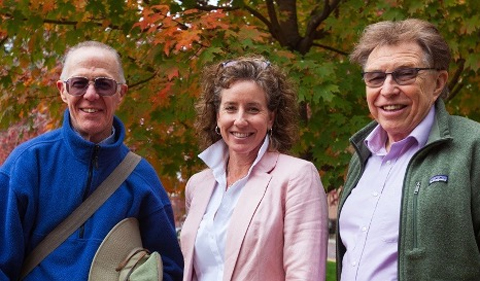Ohio University alumnus Dr. James Stratman presented on forensic linguistics and the law as part of the Linguistics Fall Colloquium series.
Stratman was named to the College of Arts & Sciences Notable Alumni in 2019.
- See Notable Alumni | James Stratman Lives Where Law and Language Entwine.
- Connect with Stratman on LinkedIn.
Using real examples of temporary restraining orders (TRO) from the Colorado court system, Stratman showed how the language used in the orders may appear to allow activities which are later interpreted as violations of the restraining order. One TRO in question read: “It is ordered that the defendant shall have no contact of any kind with the plaintiff, unless specific exceptions are stated in this order. No contact means you may not telephone, follow, or visit the plaintiff anywhere.” Stratman then gave examples of two cases in which the defendants appealed their arrests for violating the TRO and in which the appeals court gave varying interpretations of the TRO language.
In the first case, a defendant challenged the legality of his arrest, claiming that he did not “telephone, follow, or visit the plaintiff.” The defendant had gone to the plaintiff’s house with his uncle. He had waited in the car, which had been parked more than 20 yards away from the house, wile his uncle slid an envelope beneath the plaintiff’s door. The judge rejected these arguments, stating that the fact that the defendant actually went to the plaintiff’s neighborhood and there employed some other person to slide an envelope beneath the plaintiff’s door certainly falls within the plain meaning of the term ‘contact.’ “Using a human accomplice as the defendant did in this case is no different than using a long stick to slide the letter beneath the door.”
In a second case, the defendant, needed to coordinate with the plaintiff about the payment of some shared bills including a mortgage payment. In order to avoid contact with the plaintiff, the defendant, had a family friend email the plaintiff’s mother who in turn communicated with the plaintiff about the bills that needed paying. When the wife found out that the communication had originated from the husband, she called the police and the husband was arrested for violating the TRO. The defendant argued that the TRO form did not explicitly prohibit such third- or fourth-party communication on his behalf. In this case, the appeals judge sided with the defendant, arguing that “the form nowhere states or even implies that ‘telephoning, following or visiting’ are only or merely examples…We conclude that the language of the TRO is demonstrably ambiguous: after prohibiting ‘contact of any kind,’ the form abruptly and without explanation reverses itself, and provides a seemingly precise, and precisely limited, definition of ‘contact.’” The judge also suggested that added language, such as “no contact includes but is not limited to telephoning, following, or visiting the plaintiff…,” would clearly indicate that more than these three behaviors may be considered ‘contact’.

James Stratman and David Bell, Chair of Linguistics, at the College of Arts and Sciences Notable Alumni Ceremony
“It is examples like these,” contents Dr. Michelle O’Malley, Assistant Professor of Instruction in Linguistics at OHIO, “which underline the importance of forensic linguistics to the proper functioning of the law.”
“We are so thankful to Jim,” O’Malley added, “not only for his engaging colloquium talk illustrating the relevance of language study in the law, but also for the generous award that he has made to the department. This support will benefit students in our department, particularly those interested in Forensic Linguistics.”
Stratman’s talk resonated in many different ways with his audience, for whom forensic linguistics is a new field.
Brice Montgomery, a graduate student pursing an M.A. in Applied Linguistics, who had initially trained to become a police officer and had experienced the iniquitous treatment of defendants with limited English skills, commented: “Dr. Stratman’s talk served to reinforce the idea that language is powerful. In fact,” he continued, “the definition of justice depends on language, and the people who control that definition can exploit those who can’t speak up for themselves.”
Graduate student Kalynda Thayer found Stratman’s talk “engaging and thought provoking.” For Thayer, and for many in the audience who often study language in its more theoretical aspects, Stratman’s colloquium was a reminder that language is used “among real people and in real places.” And for the many international students in the audience, Stratman’s presentation prompted them to think also about the connection between language and the law in their home judicial systems.
Dr. O’Malley is teaching the first Forensic Linguistics class in spring 2020 (LING 4400/5400). It is already looking like an exciting new area for students who want to apply their knowledge of linguistics to solving real world problems.





















Comments